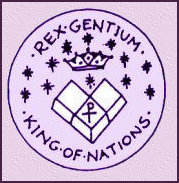Advent: December 22nd
Tuesday of the Fourth Week of Advent
Other Titles: Day 6 O Antiphons: O Rex Gentium (O King of the Nations)
» Enjoy our Liturgical Seasons series of e-books!
"A certain nobleman went into a far country to receive for himself a kingdom and to return" (Luke 19:12). This nobleman is Christ, the Son of God, King of all nations. His kingdom is over all men and over all things, both material and spiritual. He has everything in His hand as God and man. But another, Satan, has broken into His kingdom and has made himself master of many of Christ's subjects. In the old dispensation only a small part of humanity, the chosen people, remained faithful to the almighty King.
Christ, the Son of God, came into this "far country" in order to become man and, by means of humility, obedience, and poverty, to cast out the usurper who had taken His subjects. He came to reassert His dominion over all those who had left Him, both Jews and Gentiles.
According to the 1962 Missal of St. John XXIII the Extraordinary Form of the Roman Rite, today, in some places, is the feast of St. Frances Xavier Cabrini, Founder of the Missionary Sisters of the Sacred Heart. Her feast is celebrated on November 13 in the Ordinary Rite.
![]()
O King of the Gentiles
"Come and save man, whom Thou hast made out of dust." What is man? He is but a particle of dust, an insignificant creature who has further separated himself from God through sin. He has been cut off from the fountain of truth and banished from God to darkness and misery. Still in the ruins there dwells a spirit that possesses a capacity for truth. In these ashes there is yet a spark that may be fanned to life to burn with the brilliance of divine life. But only God can revive this flame. For this reason the Church cries out, "Come and save man, whom Thou hast made out of dust." Save him who is so weak, so miserable and helpless. Remember his nothingness. Consider the many enemies who lay snares to rob him of divine life and to entice him into sin. Think of his obscured knowledge and his proneness to evil, of his tendency to error, and his weakness in the face of temptation. Guard him from the enticements of the world; shelter him from the poison of erroneous teaching; deliver him from the devil and his angels.
During these days before Christmas, the Church contemplates the overwhelming misery of unregenerated mankind. She cries out, "Come and save man, whom Thou hast made out of dust."
Jesus is King of all nations. "The kings of the earth stood up and the princes met together against the Lord and against His Christ. Let us break their bonds asunder, and let us cast away their yoke from us. He that dwelleth in heaven shall laugh at them, and the Lord shall deride them. Then shall He speak to them in His anger and trouble them in His rage. But I am appointed king by Him over Sion, His holy mountain. ... The Lord hath said to Me; Thou art My Son; this day have I begotten Thee. Ask of Me and I will give Thee the Gentiles for Thy inheritance, and the utmost parts of the earth for Thy possession" (Ps. 2:2-8). Well may Herod seek the life of the newborn king. Indeed, many kings and tribes and nations in the course of time shall deprecate the divine King, Christ. But to Him has been given all power in heaven and on earth (Matt. 28: i8). Before Him every knee shall bend, and every tongue shall confess that He is the Lord (Phil. 2:10f.).
The more the mighty condemn the kingship of Christ, the more shall He be exalted by the Father.
Now He comes to us in the form of a lovely child. One day in the presence of the Roman governor He will assert His right to kingship. But after this one public confession of His royal origin He withdraws again into the obscurity which He had freely chosen. For the present He is satisfied with this manifestation of His royal dignity. The day will come, however, when He will manifest it with power and majesty as He comes again on the clouds of heaven. Before all nations God will declare: "I have anointed Him King of Sion. My holy mountain." All men shall pay Him homage as king; all nations shall acclaim Him the King of Glory.
Excerpted from The Light of the World by Benedict Baur, O.S.B.![]()
 6th O Antiphon:
6th O Antiphon:
Symbols: Crown and Scepter
Come, and deliver man, whom You formed out of the dust of the earth.
O King of the Gentiles and their desired One, the Cornerstone that makes both one; Come, and deliver man, whom You formed out of the dust of the earth.
O Rex Gentium, et desideratus earum, lapisque angularis, qui facis utraque unum: veni, et salva hominem, quem de limo formasti.
The crown and scepter signify Christ's universal kingship. As we sing in the fifth O Antiphon, Christ is not only the King of the Jewish nation, but the "Desired One of all," the cornerstone which unites both Jew and Gentile.
Recommended Readings: Apocalypse 15:1-4
![]() Today is Day Seven of the Christmas Novena.
Today is Day Seven of the Christmas Novena.






